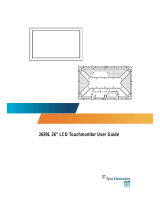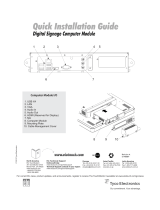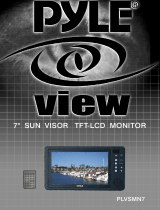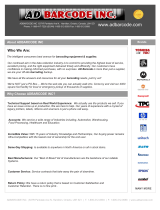Elo TouchSystems Tyco User manual
- Category
- Touch screen monitors
- Type
- User manual
This manual is also suitable for

Touchmonitor User Guide
1928L 19” LCD Desktop Touchmonitor
5000 Series

User Guide
1928L 19” LCD Desktop Touchmonitor
Revision E
P/N E116103

Copyright © 2008 Tyco Electronics Corporation. All Rights Reserved.
No part of this publication may be reproduced, transmitted, transcribed, stored in a retrieval system,
or translated into any language or computer language, in any form or by any means, including,
but not limited to, electronic, magnetic, optical, chemical, manual, or otherwise without prior
written permission of Elo TouchSystems.
Disclaimer
The information in this document is subject to change without notice. Elo TouchSystems makes
no representations or warranties with respect to the contents hereof, and specifically disclaims
any implied warranties of merchantability or fitness for a particular purpose. Elo TouchSystems
reserves the right to revise this publication and to make changes from time to time in the content
hereof without obligation of Elo TouchSystems to notify any person of such revisions or changes.
Trademark Acknowledgments
Elo Touchsystems AccuTouch and IntelliTouch are trademarks of Tyco Electronics Corporation.
Other product names mentioned herein may be trademarks or registered trademarks of their re-
spective companies.
iii

Warnings and Cautions
Warning
• Danger - Explosion hazard. Do not use in the presence of flammable anesthetics, and other
flammable materials.
• To prevent fire or shock hazards, do not immerse the unit in water or expose it to rain or
moisture.
• Do not use the unit with an extension cord receptacle or other outlets unless the prongs of the
power cord can be fully inserted.
• RISK OF ELECTRICAL SHOCK - DO NOT OPEN. To reduce the risk of electrical shock,
DO NOT remove the back of the equipment or open the enclosure. No user-serviceable parts
are inside. Refer servicing to qualified field service engineers only.
• Uninsulated voltage within the unit may have sufficient magnitude to cause electrical shock.
Avoid contact with any part inside the unit.
• This device complies with all applicable electromagnetic emission and immunity standards
for medical device equipment. This device is designed to not cause harmful interference, and
to accept any interference received, including interference that may cause undesired operation.
The performance of this device is limited to the emission and immunity standards that have
been applied. Other device which are not designed to withstand emission levels as specified
in the medical device standards may be susceptible to interference from this device.
Subjecting the device to conditions beyond the rated performance capabilities may result in
emissions in excess of the standard. If it is determined that this device produces
electromagnetic or other interference it must be disconnected from power until the cause of
the problem has been determined and resolved. If it is determined that this device is
functioning improperly due to electromagnetic and other interference it must be disconnected
from power until the cause of the problem has been determined and resolved.
• Elo TouchSystems recommends that after its useful life (or after sustaining unrepairable
damage), customers dispose of the touchmonitor and its power supply in an environmentally
sound manner. Acceptable methods include the reuse of parts or whole products and the
recycling of products, components, and materials. Please consult and obey national state, and
local laws and ordinances governing the safe disposal of electronic equipment.
Note that the fluorescent lamps inside this product contain mercury and must be recycled or
disposed of according to local, state, or national laws. For more information, contact the
Electronic Industries Alliance at www.eiae.org.
This product consists of devices that may contain mercury, which must be recycled or disposed of
in accordance with local, state, or federal laws. (Within this system, the backlight lamps in the
monitor display contain mercury.)
!
iv

Caution
• Power cord is used as a disconnection device. To de-energize equipment, disconnect the
power cord.
• This unit must follow the national requirement and local state laws to dispose unit.
• Before connecting the cables to your Elo touchmonitor, make sure all components are
powered OFF.
Only approved components complying with IEC60601-1 series can be connected to ET1928L
in Patient Environment. The use of ACCESSORY equipment not complying with the
equivalent safety requirements of this equipment may lead to a reduced safety of the resulting
system. Consideration relating to the choices of accessory equipment should include:· Use of
accessory in the patient environment.· Evidence that the safety certification of the accessory
has been performed in accordance to the appropriate IEC 60601-1 and/or IEC 60601-1-1 har
monized national standard.
• For continued safety -
- This unit only complies to the above standards if used with a medical grade power cord.
-A medical grade power supply, such as the one specified, is required for use in a medical
application.
Note:
• This symbol alerts the user to important information concerning the operation and
maintenance of this unit, which should be read carefully to avoid problems.
• This symbol means DC Current.
• This symbol means ON/OFF stand-by switch.
v
!

CAUTION-Life Support
Care must be taken when this touchmonitor is a critical component of a life support system or
device. In case of failure of this touchmonitor, appropriate redundant systems should be
incorporated into the system or device to prevent injury to the user or patient.
The following should be an integral part of the safety design of a life support system or device
using this touchmonitor for a critical function.
• An alternate interface or fail-safe must be available should the touchscreen fail to operate.
• The touchscreen interface must not be the only means of control of a critical function.
• An alternate video display should be incorporated into the safety design if used to monitor a
critical function.
• The internal speakers of this touchscreen monitor must not be the sole method of warning of
a critical function.
Critical functions are:
1. Life support devices or systems are devices or systems which, (a) are intended for surgical
implant into the body, or (b) support or sustain life, or (c) whose failure to perform when
properly used in accordance with instructions for use provided in the labeling, can be reason
ably expected to result in significant injury to the user.
2. A critical component is any component of a life support device or system whose failure to
perform can be reasonably expected to cause the failure of the life support device or system,
or to affect its safety or effectiveness.
Definitions:
“ PATIENT ENVIRONMENT”
any environment in which intentional or unintentional contact can occur between a PATIENT
and parts of the ME EQUIPMENT or ME SYSTEM or between a PATIENT and other persons
touching parts of the ME EQUIPMENT or ME SYSTEM.
!
vi

Classification
With respect to electrical shock, fire in accordance with UL60601-1 and CAN/CSA C22.2 No.
60601-1
This monitor is a Class I (GROUNDED) DEVICE.
These displays are classified NO APPLIED PARTS EQUIPMENT.
Protection against harmful ingress of water:
INGRESS PROTECTION (IPX1)
This monitor shall be classified as ORDINARY EQUIPMENT, not intended or evaluated for use
in the presence of flammable anesthetic mixture with air, oxygen, or nitrous oxide.
Mode of Operation: CONTINUOUS OPERATION.
Environmental conditions for transport and storage
Temp. Operating 0
o
C to 40
o
C
Storage / Transportation -20
o
C to +60
o
C
Humidity (non-condensing)
Operating 30% to 70%
Storage / Transportation 10% to 90%
Altitude Operating 1060hpa.
Storage / Transportation 0 to 40,000ft(12,192m)
Equivalent to 1013-303 hP.A
(14.7 to 4.4 psia)
For full Product Specifications refer to Appendix C
vii

viii
European Standards and Classifications
Standards: EN 60601-1-2: 2001
The EMC limits and test methods are referred to the following standards:
Emission: Immunity
CISPR 11: 2003+A1:2004 IEC 61000-4-2: 2001
AS/NZS CISPR 11:2004 IEC 61000-4-3: 2002+A1:2002
(Group 1, Class B) IEC 61000-4-4: 2004
IEC 61000-4-5: 2001
EN55011: 1998+A1: 1999+ IEC 61000-4-6: 2003+A1:2004
A2: 2002, (Group 1, Class B) IEC 61000-4-8: 2001
IEC 61000-4-11: 2004
IEC 61000-3-2: 2000,
(Refer to note * below)
IEC 61000-3-3; 1995+A1: 2001
Note *: The power consumption of EUT is 50.474W, which is less than 75W and no limits apply.
Therefore it is deemed to comply with IEC 61000-3-2: 2000 without any testing.

Guidance and manufacturer’s declaration-electromagnetic emissions
The ET1928L is intended for use in the electromagnetic environment specified below. The customer or the user
of the ET1928L should assure that it is used in such an environment.
Emissions test Compliance Electromagnetic environment-guidelines
RF emissions Group 1 The ET1928L uses RF energy only for its internal
CISPR 11 function. Therefore, its RF emissions are very low and
are not likely to cause any interference in nearby
electronic equipment.
RF emissions The ET1928L is suitable for use in all establishments,
CISPR 11
Class B
including domestic establishments and those directly
connected to the public low-voltage power supply
Harmonics emissions network that supplies buildings used for domestic
IEC 61000-3-2
Not applicable
purposes.
Voltage fluctuations/
flicker emissions Complies
IEC 61000-3-3
ix
Guidance and manufacturer’s declaration-electromagnetic immunity-
for all EQUIPMENT AND SYSTEMS

Guidance and manufacturer’s declaration-electromagnetic immunity-
for all EQUIPMENT AND SYSTEMS
Guidance and manufacturer’s declaration-electromagnetic immunity
The ET1928L is intended for use in the electromagnetic environment specified below. The customer or the user
of the ET1928L should assure that it is used in such an environment.
Immunity test IEC 60601 Compliance level Electromagnetic environment-
test level guidelines
Electrostatic ± 6 kV contact ± 6 kV contact Floors should be wood, concrete or
discharge(ESD) ± 8 kV air ± 8 kV air ceramic tile. If floors are covered with
IEC 61000-4-2 synthetic material, the relative humidity
should be at least 30%.
Electrical Fast ± 2 kV for power ± 2 kV for power Mains power quality should be that of a
transient/burst supply lines supply lines typical commerical or hospital
environment.
IEC 61000-4-4 ± 1 kV for input/output ± 1 kV for input/output
lines lines
Surge ± 1 kV line(s) to line(s) ± 1 kV line(s) to line(s) Mains power quality should be that of a
IEC 61000-4-5 ± 2 kV line(s) to earth ± 2 kV line(s) to earth typical commerical or hospital
environment.
Voltage dips, short <5% U
T <5% UT Mains power quality be that of a
interruption and (>95% dip in UT) (>95% dip in UT) typical commerical or hospital
voltage variations for 0.5 cycle for 0.5 cycle environment. If the user of the ET1928L
on power supply requires continued operation during power
input lines 40% U
T 40% UT mains interruptions, it is recommended that
(60% dip in UT) (60 % dip in UT) the ET1928L be powered from an
IEC 61000-4-11 for 5 cycles for 5 cycles uninterruptible power supply or a battery.
70% U
T 70% UT
(30% dip in UT) (30% dip in UT)
for 25 cycles for 25 cycles
<5% U
T <5% UT
(>95% dip in UT) (>95% dip in UT)
for 25 cycles for 25 cycles
Power frequency 3 A/m 3A/m Power frequency magnetic fields
(50/60 Hz) should be at levels characteristic of a
magnetic field typical location in a typical commerical
or hospital environment.
IEC 61000-4-8
NOTE U
T is the a.c. mains voltage prior to application of the test level.
x

Guidance and manufacturer’s declaration-electromagnetic immunity
The ET1928L is intended for use in the electromagnetic environment specified below. The user of the ET1928L
should assure that it is used in such an environment.
Immunity test IEC 60601 test level Compliance Electromagnetic environment-guidelines
level
Portable and mobile RF communications equipment
should be used no closer to any part of theET1928L,
including cables, than the recommended separation
distance calculated from the equation applicable to
the frequency of the transmitter.
Recommended separation distance
Conducted RF 3 Vrms 3 Vrms d=1.2 P
Radiated RF 3 V/m 3 Vrms d=1.2 P 80MHz to 800 MHz
IEC 61000-4-3 80 MHz to 2.5 GHz
d=2.3 P 800 NHz to 2.5GHz
where P is the maximum output power rating of
the transmitter in watts (W) according to the
transmitter manufacturer and d is the recommended
separation distance in metres(m)
Filed strengths from fixed RF transmitters, as
determined by an electromagnetic site survey
3
,
should be less than the compliance level in each
frequency range
4
.
Interference may occur in the vicinity of
equipment marked with the following symbol:
NOTE 1 At 80 MHz and 800 MHz, the higher frequency range applies.
NOTE 2 These guidelines may not apply in all situation. Electromagnetic propagation is affected by absorption and
reflection from structures, objects and people.
3.
Filed strengths from fixed transmitters, such as base stations for radio (cellular/cordless) telephones and land
mobile radios, amateur radio, AM and FM radio broadcast and TV broadcast cannot be predicted theoretically with
accuracy. To assess the electromagnetic environment due to fixed RF transmitters, an electromagnetic site survey
should be considered. If the measured filed strength in the location in which the ET1928L is used exceeds the
applicable RF compliance level above, the ET1928L should be observed to verify normal operation. If abnormal
performance is observed, additional measures may be necessary, such as reorienting or relocating the ET1928L.
4.
Over the frequency range 150 kHz to 80 MHz, field strengths should be less than 3 Vrms.
Guidance and manufacturer’s declaration-electromagnetic immunity-
for all EQUIPMENT AND SYSTEMS that are not LIFE-SUPPORTING
xi

Recommended separation distances between portable
and mobile RF communications equipment and the ET1928L
The ET1928L is intended for use in an electromagnetic environment in which radiated RF disturbances are controlled.
The customer or the user of the ET1928L can help prevent electromagnetic interference by maintaining a mini-
mum distance between portable and mobile RF communications (equipment) and the ET1928L as recommended
below according to the maximum output power of the communications equipment.
Separation distance according to frequency of transmitter
Rated maximum output 150 kHz to 80 MHz 80MHz to 800 MHz 800 MHz to 2.5 GHz
power of transmitter
W d=1.2 Pd=1.2 Pd=2.3 P
0.01 0.12 0.12 0.23
0.1 0.37 0.37 0.74
1 1.2 1.2 2.3
10 3.7 3.7 7.4
100 12 12 23
For transmitters rated at a maximum output power not listed above, the recommended separation distance d in
metres(m) can be estimated using the equation applicable to the frequency of the transmitter, where P is the
maximum output power rating of the transmitter in watts(W) according to the transmitter manufacturer.
NOTE 1 At 80 MHz and 800 MHz, the separation distance for the higher frequency range applies.
NOTE 2 These guidelines may not apply in all situations. Electromagnetic propagation is affected by absorption
and reflection from structures, objects and people.
Recommended separation distance between portable and mobile
RF communications equipment and the ET1928L
for all EQUIPMENT AND SYSTEMS that are not LIFE-SUPPORTING
xii

Warnings and Cautions................................................. iv
Warning ................................................................. iv
Caution ...................................................................v
Caution-Life Support ..................................................... vi
Classification ................................................................ vii
European Standards and Classifications
Standards ............................................................ viii
Chapter 1
INTRODUCTION 1
Product Description ................................................1
LCD Display Performance Features .......................2
19 inch TFT LCD Display Panel ......................2
External Medical Grade Power Supply............2
Chapter 2
INSTALLATION AND SETUP 3
Unpacking Your Touchmonitor ...............................3
Product Overview ........................................... 4
Main Unit .........................................................4
Back Unit .........................................................4
Side View.........................................................4
Base Bottom View ...........................................5
Kensington
TM
Lock ...........................................5
Touch Interface Connection....................................6
Step 1 Connecting the Video Cable ................6
Step 2 Connecting the Serial/USB Cable........7
Step 3 Connecting the Speaker Cable ............8
Step 4 Connecting the Power Cable ...............9
Mounting the Display ............................................10
Rear Mounting Using the VESA Interface ............11
VESA Mounting Options .......................................11
Optimizing the LCD Display..................................12
Installing the Touch Driver Software.....................12
Installing APR USB Touch Driver for
Windows XP ..................................................12
Chapter 3
OPERATION 13
About Touchmonitor Adjustments................................13
Side Panel Controls.......................................14
Controls and Adjustment ......................................15
OSD Menu Functions ....................................15
OSD Locking and Unlocking Feature ............15
OSD Control Options.....................................16
Power Display & Power Saving ............................17
General Power Saving Mode ........................17
Display Angle.................................................17
Chapter 4
TROUBLESHOOTING 19
Solutions to Common Problems ................................. 19
Appendix A
NATIVE RESOLUTION 21
Appendix B
TOUCHMONITOR SAFETY 23
Care and Handling of Your Touchmonitor ...................24
Appendix C
TECHNICAL SPECIFICATIONS 25
Display Modes .............................................................25
Touchmonitor Specifications........................................26
Power Supply Cord Selection ......................................27
North America.......................................................27
Cord selection for other than North America ........28
AccuTouch (resistive) Touchscreen Specifications .....30
IntelliTouch (acoustic) Touchscreen Specifications.....31
Acoustic Pulse Recognition Specification....................32
Appendix D
CONTACT ELO 33
Contact Elo .............................................................33
REGULATORY INFORMATION 35
WARRANTY 39
INDEX 41
Table of Contents


C H A P T E R
1
INTRODUCTION
Product Description
The 1928L is a medical display designed to present information to the operator and the customer.
The 1928L is available in serial and USB(combo) touch interface as well as non-touch. The
1928L functionally consists of a 19” LCD main display with a touchscreen. The main display
element is a 19” diagonal SXGA resolution (1280 x 1024) LCD display. The display consists of
an LCD display and touchscreen. The 1928L is powered by 12 VDC from an external medical
grade power source.
1-1

LCD Display Performance Features
19” TFT LCD Display Panel
Display format 1280 x 1024
Display area 376.32 mm (H) x 301.056 mm (V)
Pixel pitch 0.294 mm (H) x 0.294 mm (V)
Contrast Ratio 1300:1( typical)
Brightness
LCD 300 cd/m
2
(typical)
AccuTouch 246 cd/m
2
(typical)
IntelliTouch 276 cd/m
2
(typical)
Accutouch transmission 82% (typical)
Intellitouch transmission 92% (typical)
Response time Tr = 15 msec / Tf = 5 msec typical;
12 ms gray to gray response
Display color 16.7 million colors
Typical vertical viewing angle 89 deg (down) / 89 deg ( up)
Typical horizontal viewing angle 89 deg (left) / 89 deg (right)
External Medical Grade Power Supply
The 1928L is powered by an external medical grade universal input AC power source.
Power supply:
• AC power: Input voltage 100 -240 VAC, 1.0A
• Input frequency 50/60 Hz
• DC output Voltage/Current: 12 VDC/4.0A
• Load regulation: ±5% Max.
• Line regulation: ±1% Max.
1-2 Elo Touchmonitor User Guide

C H A P T E R
2
INSTALLATION AND SETUP
This chapter discusses how to install your LCD touchmonitor and how to install Elo TouchSystems
driver software.
Unpacking Your Touchmonitor
Check that the following items are present and in good condition:
LCD monitor VGA cable USB cable
Serial Cable European power cable Power cable US/Canada
(not included on APR models)
DVI Cable CD and Quick Install Guide Power adaptor
2-3
Elo QuickStart
CD
Software

Product Overview
Main Unit
Back Unit
Side View
2-4 Elo Touchmonitor User Guide

Base Bottom View
Kensington
TM
Lock
The Kensington
TM
lock is a security device that prevents theft. To find out more about this secu-
rity device, go to http://www.kensington.com.
2-5

Touch Interface Connection
Note: Before connecting the cables to your touchmonitor and PC, be sure that the computer
and touchmonitor are turned off.
STEP 1-Connecting the Video Cable
• Tilt the screen up and back to access the connection ports.
• Connect the 15-pin video cable (the ferrite bead end) or 24-pin DVI-D cable to the video
port on your PC.
• Connect the other end of the video cable to the video connector on your touchmonitor.
• Secure the cable to your touchmonitor and PC by turning the screws on the connector
clockwise.
VIDEO CABLE
VIDEO PORT
FEMALE 15-PIN
VIDEO CONNECTOR
CONNECTIONS ON UNDERSIDE
2-6 Elo Touchmonitor User Guide
Page is loading ...
Page is loading ...
Page is loading ...
Page is loading ...
Page is loading ...
Page is loading ...
Page is loading ...
Page is loading ...
Page is loading ...
Page is loading ...
Page is loading ...
Page is loading ...
Page is loading ...
Page is loading ...
Page is loading ...
Page is loading ...
Page is loading ...
Page is loading ...
Page is loading ...
Page is loading ...
Page is loading ...
Page is loading ...
Page is loading ...
Page is loading ...
Page is loading ...
Page is loading ...
Page is loading ...
Page is loading ...
Page is loading ...
Page is loading ...
Page is loading ...
Page is loading ...
Page is loading ...
Page is loading ...
Page is loading ...
Page is loading ...
Page is loading ...
-
 1
1
-
 2
2
-
 3
3
-
 4
4
-
 5
5
-
 6
6
-
 7
7
-
 8
8
-
 9
9
-
 10
10
-
 11
11
-
 12
12
-
 13
13
-
 14
14
-
 15
15
-
 16
16
-
 17
17
-
 18
18
-
 19
19
-
 20
20
-
 21
21
-
 22
22
-
 23
23
-
 24
24
-
 25
25
-
 26
26
-
 27
27
-
 28
28
-
 29
29
-
 30
30
-
 31
31
-
 32
32
-
 33
33
-
 34
34
-
 35
35
-
 36
36
-
 37
37
-
 38
38
-
 39
39
-
 40
40
-
 41
41
-
 42
42
-
 43
43
-
 44
44
-
 45
45
-
 46
46
-
 47
47
-
 48
48
-
 49
49
-
 50
50
-
 51
51
-
 52
52
-
 53
53
-
 54
54
-
 55
55
-
 56
56
-
 57
57
Elo TouchSystems Tyco User manual
- Category
- Touch screen monitors
- Type
- User manual
- This manual is also suitable for
Ask a question and I''ll find the answer in the document
Finding information in a document is now easier with AI
Related papers
-
Tyco 1928L User manual
-
Elo TouchSystems 5000 Series User manual
-
Elo TouchSystems 5000 Series User manual
-
Elo Touch Solution ET2639L User manual
-
Elo Touch Solution ET2639L User manual
-
Elo Touch Solution 1940L User manual
-
Elo TouchSystems SW601532 User manual
-
Elo TouchSystems 1541L User manual
-
Elo TouchSystems 1928L User manual
-
Elo TouchSystems 1228L User manual
Other documents
-
 Tyco Electronics 2639L User manual
Tyco Electronics 2639L User manual
-
 Tyco Electronics entuitive 1525l User manual
Tyco Electronics entuitive 1525l User manual
-
 Tyco Electronics E190089 User manual
Tyco Electronics E190089 User manual
-
Elo 1903LM User guide
-
 Cables Direct DV-001 Datasheet
Cables Direct DV-001 Datasheet
-
Elo 2270L 22" Touchscreen Monitor User guide
-
 PYLE Audio PYLE View Series PLVSMN7 User manual
PYLE Audio PYLE View Series PLVSMN7 User manual
-
Dell MR2217 User guide
-
Canvys DCT08D00893BE User manual
-
 Tyco Electronics 1522L-XXWB Series User manual
Tyco Electronics 1522L-XXWB Series User manual






























































